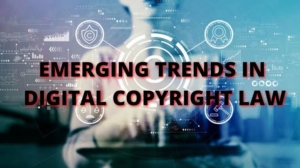EMERGING TRENDS IN DIGITAL COPYRIGHT LAW
The ‘Internet’ has become that arresting feature of our lives that has become absolutely indispensable. This search engine produces such reproduction of original works and that too in such a lightning speed, it has become a headache for the IPR enthusiasts. Hence, a very strong and convincible Digital Copyright law is the need of the hour.
CURRENT TRENDS/ISSUES IN DIGITAL COPYRIGHT LAW
The digital technology has a phenomenal impact on copyright works- its creation, dissemination, and protection. Digitization has made it much easier to manipulate, reproduce, and distribute protected works. Digital content can be combined, altered, mixed, and manipulated easily. By enabling the making of perfect copies of copyrighted works for little cost, digital technology threatens to undermine the distribution systems and increase unauthorized use of copyright works1. Digital technology enables users to search & manipulate information available online in the network thus, users are transforming into ‘authors’! The decentralized nature of Internet makes it possible for any user to disseminate a work endlessly in the cyberspace through an end number of outlets, thereby giving rise to global piracy. Estimates of global losses from pirated books, music and entertainment software range into billions of dollars. The Internet in a way presents a troublesome situation for copyright holders as the users become mass disseminators of others copyright material and creates disequilibrium between the authors and users2. Some of the burning issues are,
1) The Right of Reproduction – The advent of the Internet makes the delimitation of the reproduction right more problematic in the digital age. Given that any transmission of protected works over the Internet involves the reproductions transitorily stored in the connected computers’ RAM3, the question of whether right owners should be granted with the control over all temporary reproductions looms large amid the dematerialized and decentralized nature of the Internet. It is pertinent to note that in ‘WIPO Performances and Phonograms Treaty’, producers are vested with “the exclusive right of authorizing the direct or indirect reproduction of their respective protected subjects in any manner or form†(Articles 7, 11 and 16 respectively).
2) The Right of Communication to the Public -The advent of human intellectual work in digital work is a very risky one. The internet via its innumerable yet indeterminable sources can make such original works of the author be communicated to the public. Hence, the author is left vulnerable to the atrocities of the digital age! Moreover, the issue concerning the secondary liability of those who facilitate the infringing communication of works to the public, including Internet Service Providers (ISPs), has not yet been addressed.
THE GOOGLE CASE -This famous case is known as Authors Guild, Inc. v. Google Inc4.Defendant, Google, Inc. collaborated with several major research libraries to digitize their collections for the Google Books project. Plaintiffs, the Authors Guild, Inc. and individual copyright owners, complained that Google scanned more than twenty-million books without permission or payment of license fees. Google made the digital copies available to its library partners. Plaintiffs alleged that Google infringed by using copyrighted books without permission. The United States District Court for the Southern District of New York held that Google’s digitization and subsequent use of the copyrighted works was fair use and granted summary judgment in Google’s favor. Hence, it was held that ‘fair use was found’.Â
THE INDIAN SCENARIO-The Google case enlightened the Indian law to become arouse of the current issues pertaining to digital copyright. The Amendments introduced by the Copyright Amendment Act, 2012 are significant as they address the challenges posed by the Internet. The latest Amendment harmonizes the Copyright Act, 1957 with WPPT. The striking feature that has been added is in the form of exception. A fair dealing exception (Section 52, Indian Copyright Act) has been extended to the reporting of current events, including the reporting of a lecture delivered in public. Earlier, fair dealing exception was limited for (i) private or personal use, including research, and (ii) criticism or review whether of that work or of any other work. Further, it has been clarified that the storing of any work in any electronic medium for the purposes mentioned in this clause, including the incidental storage of any computer programme which is not an infringing copy, does not constitute infringement5. The transient and incidental storage of a work or performance for the purpose of providing electronic links, access or integration, where such links, access or integration has not been expressly prohibited by the right holder, unless the person responsible is aware or has reasonable grounds for believing that such storage is of an infringing copy: Provided that if the person responsible for the storage of a copy, on a complaint from which any person has been prevented, he may require such person to produce an order within fourteen days from the competent court for the continued prevention of such storage.
Thus, the present digital age has come with plethora of advantages accompanied with its own disadvantages. Such advancement has posed as great hurdles for copyright holders. Therefore, steps are being taken to tackle and bring about bolder & convincible laws against digital infringement and fair use.
This publication is provided for general information and does not constitute  any legal opinion.This publication is protected by copyright. © 2022 Astrea Legal Associates LLP
Contributed by : Ms. Sonya Mohan Associate Advocate





